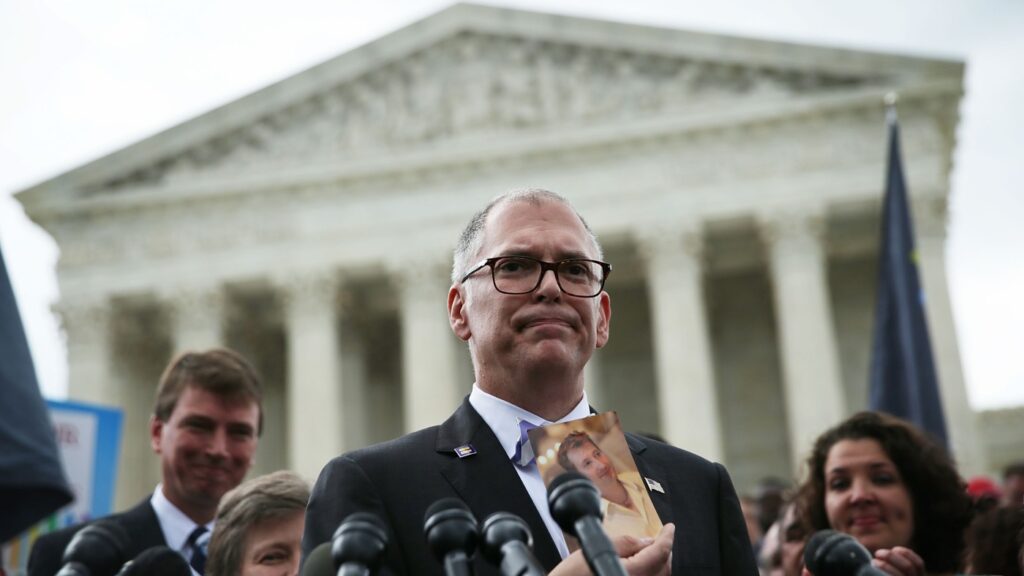
WASHINGTON, DC - JUNE 26: Plaintiff Jim Obergefell holds a photo of his late husband John Arthur as he speaks to members of the media after the U.S. Supreme Court handed down a ruling regarding same-sex marriage June 26, 2015 outside the Supreme Court in Washington, DC. The high court ruled that same-sex couples have the right to marry in all 50 states. (Photo by Alex Wong/Getty Images)
WASHINGTON, D.C. – A decade after securing a landmark victory for marriage equality, Jim Obergefell reflects on the ongoing struggle for LGBTQ+ rights in the United States.
Immediate Impact of Obergefell v. Hodges
Jim Obergefell, whose legal battle led to the historic Supreme Court decision in Obergefell v. Hodges, is marking the ten-year anniversary of the ruling that legalized same-sex marriage nationwide. This victory, however, is overshadowed by concerns over the current state of LGBTQ+ rights.
Obergefell’s husband, John Arthur, passed away before witnessing the full realization of their fight. Diagnosed with ALS, Arthur’s condition was a catalyst for their legal journey, which culminated in a decision that changed the lives of countless Americans.
Key Details Emerge from Their Journey
In 2013, following the partial repeal of the Defense of Marriage Act, Obergefell and Arthur seized the opportunity to marry, despite Arthur’s deteriorating health. Support from friends and family enabled them to travel to Maryland for their wedding, a poignant moment captured on the tarmac of Baltimore Washington International Airport.
“For the past 20 years, 6 months and 11 days, it’s been love at every sight,” Obergefell said during their vows.
Despite their marriage being recognized federally, their home state of Ohio refused to acknowledge it, prompting Obergefell’s legal challenge that would ultimately reach the Supreme Court.
By the Numbers: Public Opinion and Legal Milestones
- 2013: United States v. Windsor ruling recognized same-sex marriages federally.
- 2015: Obergefell v. Hodges legalized same-sex marriage nationwide.
- Over 70% of Americans now support marriage equality, according to recent polls.
Expert Analysis: The Fight for Equality Continues
In an interview with NPR’s Leila Fadel, Obergefell expressed his fears regarding the potential rollback of hard-won rights. “It’s terrifying to see all of these attacks on the queer community,” he stated, highlighting the particular vulnerability of transgender individuals.
Obergefell’s reflections are set against a backdrop of legislative challenges and societal shifts. Despite the progress made, he remains vigilant, emphasizing the importance of continued advocacy.
Background Context: A Decade of Change
The 2015 Supreme Court decision was a watershed moment in American civil rights history. It not only granted legal recognition to same-sex marriages but also symbolized a broader acceptance of LGBTQ+ relationships.
Since then, public support for marriage equality has grown substantially. However, Obergefell notes the ongoing challenges faced by the community, including legislative efforts that threaten to undermine these rights.
What Comes Next for LGBTQ+ Rights?
Looking forward, Obergefell remains committed to advocating for equality. He draws inspiration from the resilience of the LGBTQ+ community and the progress achieved over the years.
“We have always raised our voices to say we exist, we are here,” Obergefell asserted, underscoring the need for continued activism.
As the nation reflects on a decade of marriage equality, the fight for broader LGBTQ+ rights persists. Obergefell’s journey serves as a testament to the power of perseverance and the ongoing struggle for justice.
This digital article was edited by Obed Manuel. The radio version was edited by Lisa Thomson.







